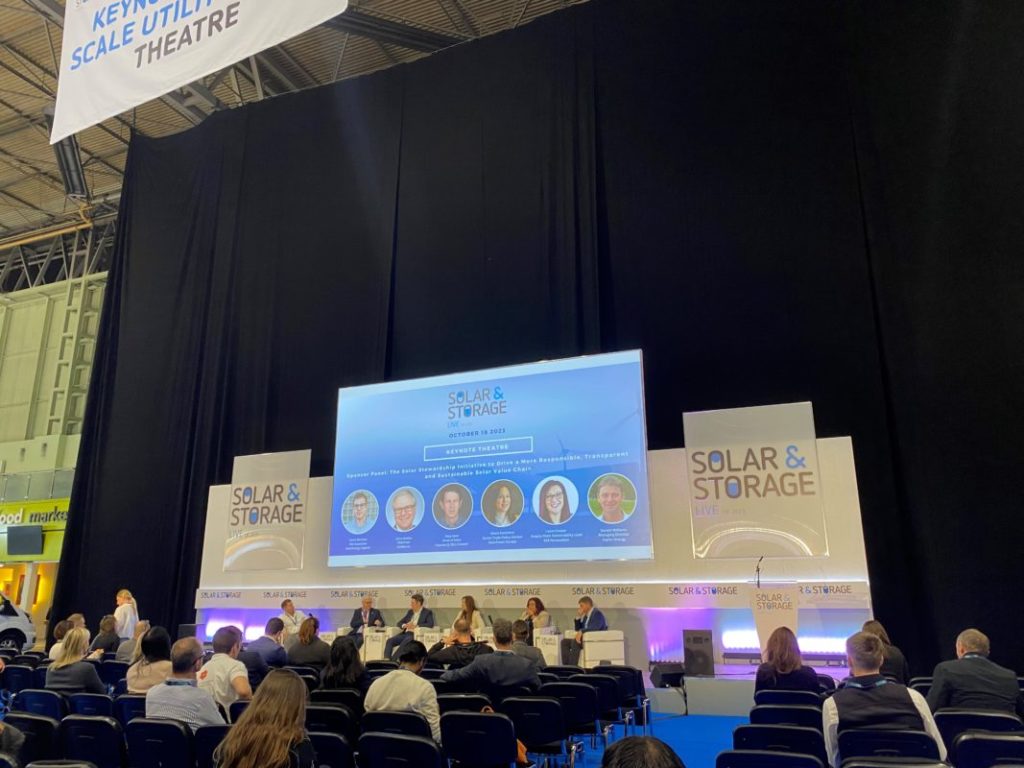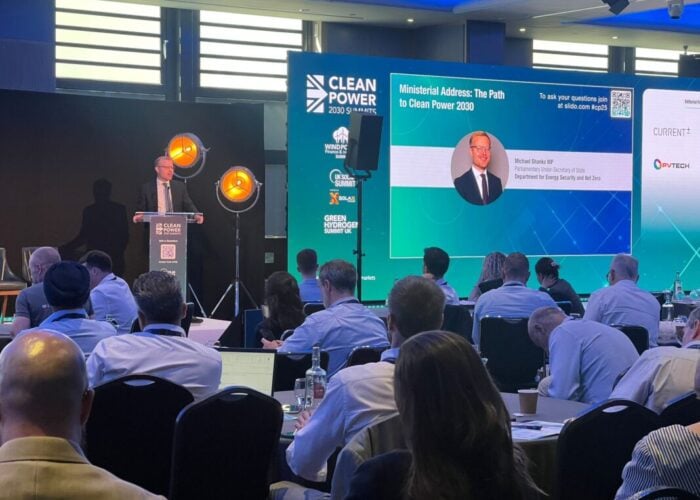
The Solar Stewardship Initiative (SSI) to Drive a More Responsible, Transparent and Sustainable Solar Value Chain panel began with Alexia Ruvoletto, senior trade policy advisor at SolarPower Europe, announcing the opening of applications for 2024 membership to the SSI.
On day two of the Solar & Storage Live conference in Birmingham, England, and in front of an auditorium comprising some the biggest names in solar, the panellists in the discussion emphasised the central role that environmental, social and governance (ESG) compliance and supply chain traceability is coming to play in the solar industry.
Unlock unlimited access for 12 whole months of distinctive global analysis
Photovoltaics International is now included.
- Regular insight and analysis of the industry’s biggest developments
- In-depth interviews with the industry’s leading figures
- Unlimited digital access to the PV Tech Power journal catalogue
- Unlimited digital access to the Photovoltaics International journal catalogue
- Access to more than 1,000 technical papers
- Discounts on Solar Media’s portfolio of events, in-person and virtual
The panellists also expressed the opinion that manufacturers wishing to gain access to the largest markets in the world will need to open up their operations to social and moral scrutiny.
When asked about the growing interest in the ethics of manufacturers’ supply chains, head of sales at Hanwha Qcells, Ross Kent, said: “Throughout this show, we’re having conversations with a view to making sales, and the first 50% of the conversation is all about the ethical approaches of the module manufacturer. How do we source our modules? How do we have the traceability through the supply chain?
He continued: “That just wasn’t the case a few years ago, it wasn’t even mentioned. Now it’s very much the top of the agenda, not just for installers but we’re seeing a lot of demand from the end client … blue chip clients that are really interrogating the supply chain to make sure they can achieve certain things.”
Growing industry pressure
This industry pressure, where customers are looking for the most traceable modules, was emphasised more than once by the panellists and Ruvoletto explained it as one of the key factors that might drive the SSI to a meaningful position:
“For manufacturers … it’s very important to maintain their access to the EU and UK markets [the same can be said of the US] and at the same time for PV buyers it’s important to signal to their customers – but also policy makers and governments – that they’re doing something about this and not just passively watching.
“Let’s face it,” Ruvoletto continued, “all these topics that we’ve mentioned – forced labour, environmental pollution – are not going away.”
Indeed, just this week two committees in the EU adopted a proposed regulation banning the import or export of any product proven to have forced labour in its supply chain, and one of the co-rapporteurs of the proposal said that she “expects [solar panels] to be on the list of high-risk products.” Legal adoption of the policy and its details are yet to be confirmed.
A similar policy already exists in the US – the Uyghur Forced Labor Prevention Act – and resulted in at least 2GW of solar modules being held at US customs, pending proof of their sourcing from a clean supply chain last year.
Balancing ethical compliance and sustained growth
This underlying point was one that perhaps was not a central point of the discussion: how does the solar industry continue to keep up with the moral demands of fighting climate change and deploying GWs of solar whilst simultaneously interrogating its own methods of operation and the basis of its supply chain?
Jerry Stokes, chairman of UK sustainable infrastructure company Gridserve, said: “I think now we’re at this really very, very critical point … to grow at the speed and scale to credibly move the needle on climate change, deploying solar very rapidly, without doing that at the expense of the rights of individuals.
“Whether that’s indigenous peoples whose lands we’re extracting materials from, whether it’s the exploitation of workers, or its through considering the end of life of all the material and products we’re using in our industry.”
The SSI aims to establish transparency criteria for solar supply chains, acting ultimately as a third-party to determine a standard for industry practices across both ESG and supply concerns. According to Kent, this third-party status may make it more attractive for module manufacturers, which have previously encountered criticism for a lack of transparency in their supply chains and business partnerships.
“We strongly believe that our supply chain is clean,” he said, “and there’s a lot of work in the background to ensure that’s the case, but we have a difficult time in being fully open about our supply chain. Often we’re under a non-disclosure agreement or contractual reasons why we can’t name a supplier, and there’s also commercial reasons why we wouldn’t want to do that.
“It’s an industry, we don’t necessarily want to broadcast to the entire market where we source materials from,” continued Kent. “The concept of the SSI plays into that, it allows a central avenue to be open and transparent and give those [supplier] names away but maintain our commercial interests.”
“We’re fully aware of the scale of the problem,” Ruvoletto said, highlighting how the issue has not yet been resolved. “What we’re trying to build is something rigorous and something that can give the required assurance to the market, to the policymakers, to other stakeholders in the value chain.”







